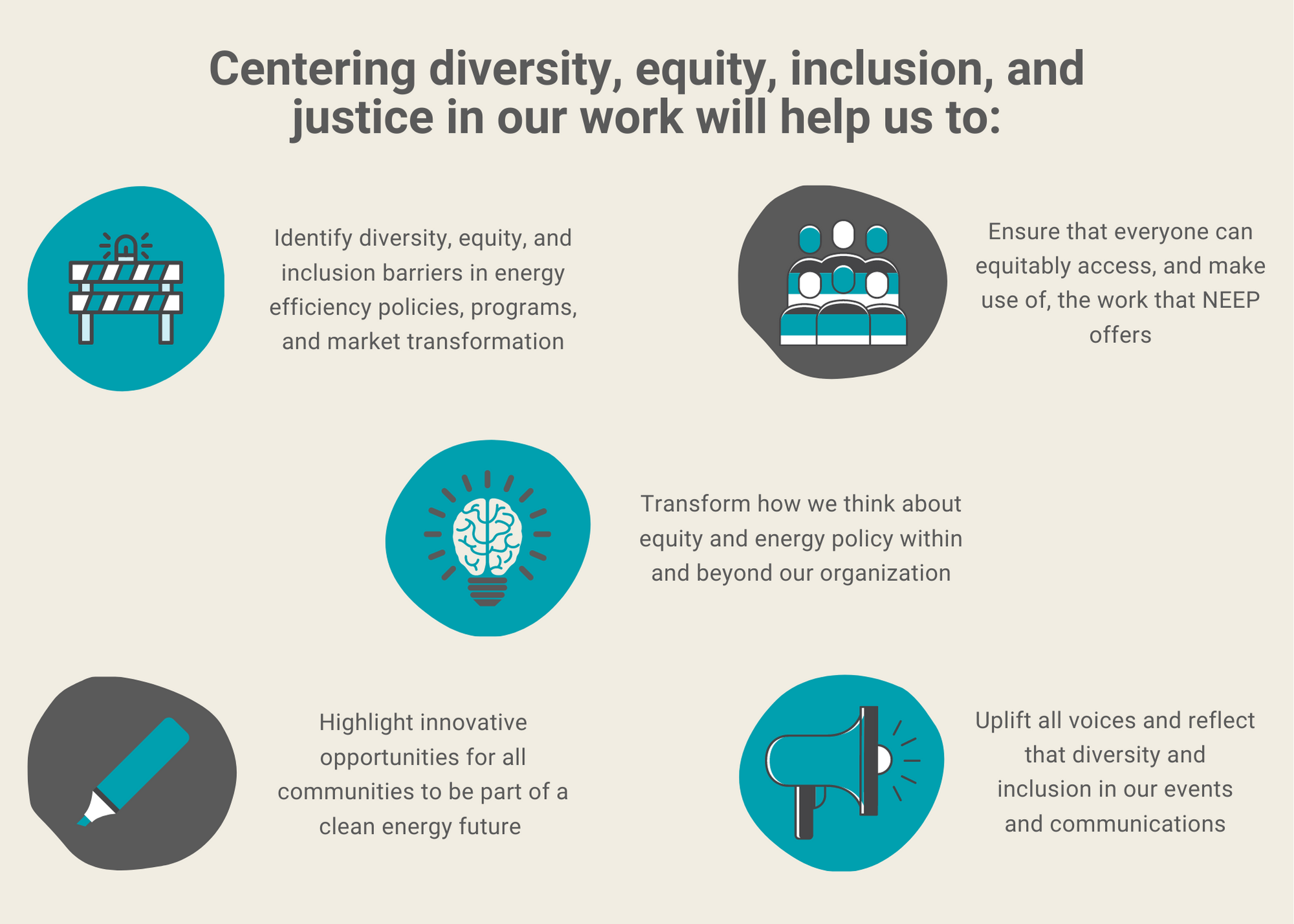
Decarbonizing the building sector requires continued innovation and rapid scaling of existing solutions. In order to decarbonize with equity, marginalized communities must be prioritized in the transition, and solutions that reduce energy and carbon must also improve the health, safety, comfort, and affordability of homes and buildings and reduce the energy cost burden while creating valuable, well-paid local jobs. This work requires new partnerships, program models, and goals.
Why is DEIJ Important to NEEP?
Every day, NEEP strives to make the built environment a more efficient, affordable, low-carbon place to live, work, and play. People of color and people living in historically marginalized communities are being left behind in the low-carbon transition. A history of environmental racism and inequitable energy decision-making have led to marginalized communities bearing the largest impacts of the fossil fuel economy, but not receiving all the benefits of clean energy. We believe it is the responsibility of organizations like NEEP to help combat these injustices and make the benefits of energy efficiency more accessible to and impactful for all.
NEEP is committed to putting the needs of the people we serve first and foremost. People-centered problems need people-centered solutions. Nowhere is this truer than when we are dealing with historically marginalized communities. We cannot rely solely on data - it doesn’t tell the whole story of the energy insecurity struggles faced by individuals, families, and communities, including those struggling with high energy bills. As a regional convener and collaborator, we hear perspectives from people in a variety of roles across 13 jurisdictions, and we know that people know their own community’s problems and solutions best.
We don’t have all the answers, but we can listen. And we know that discovering and supporting an equitable low-carbon future will take time, empathy, hard work, and courage. Leading by example also means doing our part to educate ourselves on the principles of diversity, equity, inclusion, and justice, and being compassionate with ourselves, with our audiences, and with our communities while we do this work.
NEEP is committed to integrating DEIJ in all aspects of our work, and we recognize that the work we do is more than just reducing energy consumption. Energy efficiency can serve as a foundation for a just and equitable transition to a clean energy future by reducing the energy cost burden, improving affordability, creating safe homes and buildings, investing in local communities, improving public health, generating sustained economic growth with good paying jobs, and creating opportunities to undo past injustices in the energy, housing and environmental sectors.
As we embed diversity, equity, inclusion, and justice in our core values and organizational culture, we are confident that we will generate deeper and more varied insights that will help us to better serve our allies, partners, and funders.
NEEP's DEIJ Work
Many aspects of the energy system are deeply rooted in decision-making processes designed to marginalize some people and benefit others. At NEEP, we make it a point to develop, implement, and constantly evaluate inclusive decision-making processes that welcome all people and listen to all perspectives. NEEP also values the leadership inherent in lived experience and respects those from all backgrounds.
NEEP recognizes that it is, and has been, a white-dominated organization. We are committed to diversifying our organization through re-envisioning our hiring and other internal processes and centering diversity, equity, inclusion, and justice in each facet of our work.
NEEP’s staff and board are committed to pursuing equity. The NEEP staff has a DEIJ working group with specific short-term and long-term goals to advance these values at NEEP and beyond. The working group leads the development of resources to aid staff in implementing equitable practices in daily work. The group also regularly convenes staff for caring conversations in which participants engage in open and honest dialogue around difficult topics with the aim of breaking down barriers to achieving equity. Some of our ongoing projects include:
- Resources to build an equitable workforce and create equitable decarbonization;
- Guidance on participatory processes to intentionally include and center traditionally excluded communities;
- Inclusion of equity suggestions in all aspects of our policy work, from metrics to program tracking to innovative tools to alleviate historical barriers; and
- Development, in conjunction with a consultant, of annual work plans to ensure DEIJ issues are front and center in NEEP’s work.
Areas of Commitment
We know that this is a work in progress. We are constantly learning and welcome the participation of our partners - including new partners - to create a just, equitable, low-carbon economy. Here are a few areas we’re committed to:
Investment
- Through technical assistance, NEEP will help states and communities make equitable investments in energy efficiency solutions. NEEP will offer guidance on inclusive stakeholder engagement practices and equitable policy and program development, among other topics.
- Since 2020, NEEP has dedicated a percentage of our total budget, including hours of staff time, to making our organization a more diverse and welcoming place to work.
Data
- NEEP will develop and track metrics to evaluate our progress towards achieving equity in both our internal and external work. Metrics can serve to identify key issue areas and hold us accountable as we continue to embed equity into our work and culture.
- NEEP will track clean energy commitments, legislation, and utility plans which include equity goals to learn best practices and share opportunities.
- NEEP will learn where and how equity shows up in energy policy and program decisions. Beyond measurable impacts, commitment to equity is a commitment to improving knowledge of inequities and tools to combat them.
Qualitative
- NEEP will engage in meaningful discourse with allies, partners, decision-makers, and community leaders, including organizations and individuals who have not historically been reached by NEEP across the region, to learn how NEEP can better serve historically marginalized and excluded communities.
Resources
NEEP Resources
Recognizing Energy Inequities for Building Decarbonization
Near-Term Strategies for Centering Equity in Building Decarbonization
Systemic Barriers to Building Energy Code Adoption
Using Data to Help Achieve Decarbonization and Equity Goals
Implementation Guide: Cap and Invest for Equitable Decarbonization
General Resources
There are many resources that can assist your organization in learning about diversity, equity, and inclusion, why it matters in the non-profit sector, and how to begin to create a DEIJ-centered culture. Here are some that NEEP has found particularly useful in our own journey.
Diverse City: Diversity 101 – Defining Diversity
Diverse City: DEI 201 – What is Diversity, Equity, and Inclusion?
National Council of Non-Profits: Why Diversity, Equity, and Inclusion Matter for Non-Profits
Candid (formerly Guidestar): Improve Your Non-Profit
Massachusetts Nonprofit Network: Racial Justice and Diversity, Equity, and Inclusion Resources
YWBoston: Creating More Inclusive Environments in Boston
Energy Related Resources
Here are some organizations in the energy industry that are leading the way in centering the principles of diversity, equity, inclusion, and justice in their work.
NAACP Environmental and Climate Justice program
National Association of State Energy Officials (NASEO) Equity Committee
The American Association of Blacks in Energy
Government Resources
Here are some resources from the federal government that highlight energy-specific entities and their commitment to diversity, equity, inclusion, and justice.
Delegates to the First National People of Color Environmental Leadership Summit held on October 24-27, 1991, in Washington D.C., drafted and adopted these 17 principles of Environmental Justice.
Environmental Protection Agency Environmental Justice Program
Department of Energy Environmental Justice Resources
DOE National Laboratories Diversity, Equity, and Inclusion
White House Executive Order on Diversity, Equity, Inclusion, and Accessibility in the Federal Workforce



